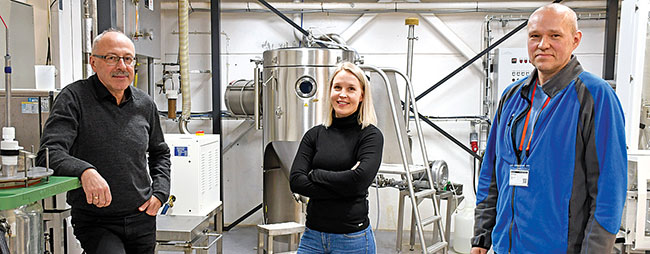
EU scientists discover higher-value byproducts made from fish waste
March 12, 2021
By
Liza Mayer
 EU scientists see potential for high value creation from fish waste. (L-R) Scientist Jan Arne Arnesen and Principal Engineer Kjersti Lian of Nofima, and Professor Peik Haugen of UiT Photo: Rune Stoltz Bertinussen/Krysspress
EU scientists see potential for high value creation from fish waste. (L-R) Scientist Jan Arne Arnesen and Principal Engineer Kjersti Lian of Nofima, and Professor Peik Haugen of UiT Photo: Rune Stoltz Bertinussen/Krysspress Residual fish products that European Union scientists converted into oils, proteins and solids, which they then combined with bacterial strains from the Artic seabed have resulted into “new molecules” that have the potential to be turned into highly valuable raw materials.
The discovery is the latest in the EU-funded research project that’s investigating ways to add value to fish byproducts to reduce waste and enhance the seafood industry’s sustainability.
The researchers said that while fish byproducts, such as offcuts, skin and bones, are already being used in fish oils, fish meal and animal feed, they are worth only $.33 cents/kg on average. Byproducts that could be applied in products fit for human consumption would be worth much higher, they said.
Of the roughy 20 molecules created from the bacteria-residual raw materials combo, one is widely used by pharmaceutical companies in both blood pressure and allergy medications and is valued at $1,000 per gram (NOK 8500) per gram, said Nofima. Scientists from the esteemed research institution lead the project, along with colleagues from UiT – the Arctic University of Norway.
“The way forward for the scientists now is about developing the discoveries they have already made. Perhaps in a few years, both new companies and new jobs will have been created as a result of these findings,” Nofima said.
Advertisement
- Oyster culture: newest frontier in agribusiness
- ‘Farm-on-a-boat’ idea could disrupt shellfish industry





